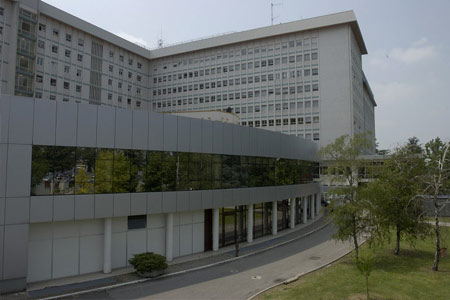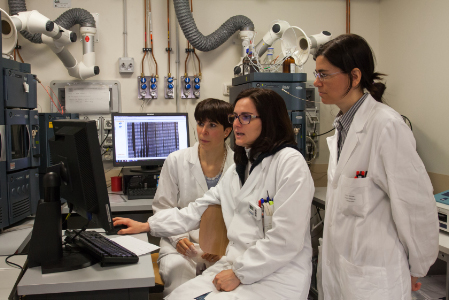- Authors:
-
Humphries, Matthew P; Sundara Rajan, Sreekumar; Droop, Alastair; Suleman, Charlotte A. B; Carbone, Carmine; Nilsson, Cecilia; Honarpisheh, Hedieh; Cserni, Gabor; Dent, Jo; Fulford, Laura; Jordan, Lee B; Jones, J. Louise; Kanthan, Rani; Litwiniuk, Maria; Di Benedetto, Anna; Mottolese, Marcella; Provenzano, Elena; Shousha, Sami; Stephens, Mark; Walker, Rosemary A; Kulka, Janina; Ellis, Ian O; Jeffery, Margaret; Thygesen, Helene H; Cappelletti, Vera; Daidone, Maria G; Hedenfalk, Ingrid A; Fjällskog, Marie Louise; Melisi, Davide; Stead, Lucy F; Shaaban, Abeer M; Speirs, Valerie
- Title:
-
A Case-Matched Gender Comparison Transcriptomic Screen Identifies eIF4E and eIF5 as Potential Prognostic Markers in Male Breast Cancer
- Year:
-
2017
- Type of item:
-
Articolo in Rivista
- Tipologia ANVUR:
- Articolo su rivista
- Language:
-
Inglese
- Referee:
-
No
- Name of journal:
- Clinical Cancer Research
- ISSN of journal:
- 1078-0432
- N° Volume:
-
23
- Number or Folder:
-
10
- Page numbers:
-
2575-2583-2583
- Keyword:
-
male breast cancer
- Short description of contents:
- Purpose: Breast cancer affects both genders, but is understudied in men. Although still rare, male breast cancer (MBC) is being diagnosed more frequently. Treatments are wholly informed by clinical studies conducted in women, based on assumptions that underlying biology is similar.Experimental Design: A transcriptomic investigation of male and female breast cancer was performed, confirming transcriptomic data in silico Biomarkers were immunohistochemically assessed in 697 MBCs (n = 477, training; n = 220, validation set) and quantified in pre- and posttreatment samples from an MBC patient receiving everolimus and PI3K/mTOR inhibitor.Results: Gender-specific gene expression patterns were identified. eIF transcripts were upregulated in MBC. eIF4E and eIF5 were negatively prognostic for overall survival alone (log-rank P = 0.013; HR = 1.77, 1.12-2.8 and P = 0.035; HR = 1.68, 1.03-2.74, respectively), or when coexpressed (P = 0.01; HR = 2.66, 1.26-5.63), confirmed in the validation set. This remained upon multivariate Cox regression analysis [eIF4E P = 0.016; HR = 2.38 (1.18-4.8), eIF5 P = 0.022; HR = 2.55 (1.14-5.7); coexpression P = 0.001; HR = 7.04 (2.22-22.26)]. Marked reduction in eIF4E and eIF5 expression was seen post BEZ235/everolimus, with extended survival.Conclusions: Translational initiation pathway inhibition could be of clinical utility in MBC patients overexpressing eIF4E and eIF5. With mTOR inhibitors that target this pathway now in the clinic, these biomarkers may represent new targets for therapeutic intervention, although further independent validation is required. Clin Cancer Res; 23(10); 2575-83. ©2016 AACR.
- Product ID:
-
97808
- Handle IRIS:
-
11562/963805
- Last Modified:
-
November 15, 2022
- Bibliographic citation:
-
Humphries, Matthew P; Sundara Rajan, Sreekumar; Droop, Alastair; Suleman, Charlotte A. B; Carbone, Carmine; Nilsson, Cecilia; Honarpisheh, Hedieh; Cserni, Gabor; Dent, Jo; Fulford, Laura; Jordan, Lee B; Jones, J. Louise; Kanthan, Rani; Litwiniuk, Maria; Di Benedetto, Anna; Mottolese, Marcella; Provenzano, Elena; Shousha, Sami; Stephens, Mark; Walker, Rosemary A; Kulka, Janina; Ellis, Ian O; Jeffery, Margaret; Thygesen, Helene H; Cappelletti, Vera; Daidone, Maria G; Hedenfalk, Ingrid A; Fjällskog, Marie Louise; Melisi, Davide; Stead, Lucy F; Shaaban, Abeer M; Speirs, Valerie,
A Case-Matched Gender Comparison Transcriptomic Screen Identifies eIF4E and eIF5 as Potential Prognostic Markers in Male Breast Cancer
«Clinical Cancer Research»
, vol.
23
, n.
10
,
2017
,
pp. 2575-2583-2583
Consulta la scheda completa presente nel
repository istituzionale della Ricerca di Ateneo 








